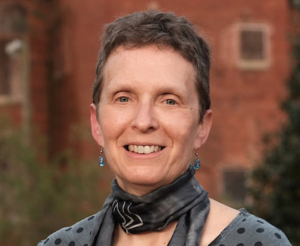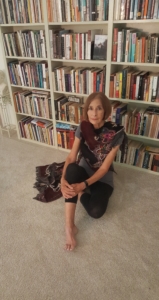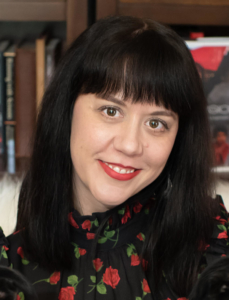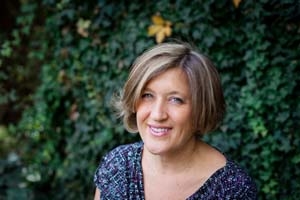Where There’s Poetry, Prose Will Surely Follow
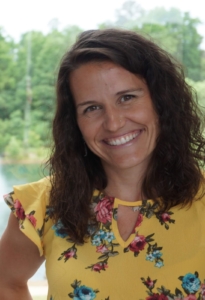 A few weeks ago, I had the honor of hearing Ada Limón read her work at Queens University as part of the Charlotte Lit’s 4X4 Series. Small in stature but huge in heart, her warmth and wit filled the auditorium while her words brought tears to our eyes. One piece in particular struck a chord with me.
A few weeks ago, I had the honor of hearing Ada Limón read her work at Queens University as part of the Charlotte Lit’s 4X4 Series. Small in stature but huge in heart, her warmth and wit filled the auditorium while her words brought tears to our eyes. One piece in particular struck a chord with me.
“The Raincoat” (excerpt)
…My god,
I thought, my whole life I’ve been under her
raincoat thinking it was somehow a marvel
that I never got wet.
And there it was, the reaction I have experienced so many times before when faced with heart-shattering imagery that hits a little too close to home. I had to write. Immediately.
I went home that night and sat at my computer. It wasn’t that I believed I could write poetry of my own or even some polished piece that would someday rival Limon’s brilliance. It was because I am a writer and words are how I process the world. The mother I lost to Alzheimer’s was my raincoat and now I must do the same for my two teenage children. Hearing Limón point it out so boldly left me spiraling with emotions and ideas. There was nowhere to hide.
Poetry makes us better humans by stirring up our emotional pots. It does not mean that we all must write it, but I have countless drafts that started because someone crafted a piece of poetry that shook me to my very core. It was an image or idea staring at me in the sea of blank space on the page. In all that silence, it could not be ignored. My words poured onto the page.
Pandora’s box had been opened to a sea of memories, regrets, resentments, and everything in between for me that September evening. Facing these demons is hard and necessary work, and while prose is my form of choice, I am thankful every day for the poets who awaken my soul to what lies bubbling just below the surface.
ABOUT JAMIE: Jaime Pollard-Smith is a full-time writing instructor at Central Piedmont Community College with a Master of Arts from New York University. Her fiction has been published in Literary Mama. She is a contributor for Scary Mommy and Project We Forgot. Read her thoughts at unbecoming.co.
PUT POETRY INTO YOUR PROSE: Join Jamie for Putting Poetry Into Your Prose on December 2nd, in person at Charlotte Lit. What can the prose writer learn from the poet? Let us count the ways: sound, rhythm, word play, word choice, concision, and so much more. In this session, we’ll read and discuss several prose passages that employ one or more tricks from the poet’s toolbox. Then, we’ll explore the ways we can use those techniques to strengthen our own prose, trying our hands at a few of them through in-class writing prompts.
PLEASE NOTE: Proof of full Covid vaccination is required to attend in-person Charlotte Lit events. Send a pic of your vaccination card to staff@charlottelit.org.
Historical Fiction
The Past Comes Alive on the Page
The task facing the historical fiction writer is to bring research to life. In a journal article or history book, you might read that 19th-century American theaters were rowdy places in which audiences frequently booed actors off the stage. In contrast, a historical novel would take you into the boxes and “parquet,” or orchestra seating, and show the repercussions of a poor performance. This excerpt from my forthcoming novel, Dear Miss Cushman, set in the New York City theater world in 1852, demonstrates this idea.
When the audience began hissing, I knew Othello wasn’t going to end well. The response jolted me. We weren’t at the Bowery Theatre, where the audience in the pit tossed apples and vegetables onto the stage if a performance didn’t please them. The Prince Theatre was one of New York City’s finest establishments, catering to the upper ten.
Worse, the actor they hissed at was my father.
I was attending my first theatrical performance. Incredible, given that my father was a renowned leading actor, but Mama maintained that theater wasn’t a place for young ladies. For my eighteenth birthday, she gave in to my pleading and permitted Uncle James to accompany me to my father’s performance of the Moor, one of his most acclaimed roles. Mama insisted I have a new dress, and my sister Maude oohed and aahed over the sky blue taffeta until I wanted to take it off and give it to her. I myself put little stock in puffy lady things, especially in pastel hues. Plus, the heavy horsehair crinoline the skirt required for shape made beads of sweat trickle down my stomach.
Still, I could abide these discomforts if it meant I got to sit beside my dapper uncle in his lushly adorned box, draped with red and gold silk, and marvel at the glistening gas-jet chandelier that lit the space. Best of all, I got to watch my father tread the boards as I’d imagined him doing, in full costume and makeup for the Moor and sporting his prize sword.
We were barely one act in when Pa dropped a few lines. Then more—even the ones I ran with him that morning “for good measure,” as he’d urged. He’d appeared in Othello dozens of times, but now the role appeared to baffle him. Although the movement made my stays pinch, I leaned forward, mouthing the words, willing them into his memory.
Taunts rose slowly through the cavernous parquet. Pa squinted toward the footlights in bewilderment….
The audience response crescendoed into boos. Uncle James colored crimson. “We’re leaving,” he announced, spittle collecting at the corners of his lips. He tugged me to my feet. “Now, Georgiana.”
Paula Martinac is the author of the forthcoming historical novel Dear Miss Cushman (Bywater Books, December 2021), and six others, including Testimony; Clio Rising, Gold Medalist, Northeast Region, 2020 Independent Publisher Book Awards; and The Ada Decades, a finalist for the 2018 Ferro-Grumley Award in LGBTQ Fiction. Out of Time, her debut novel, won a Lambda Literary Award. She has received fellowships from North Carolina Arts Council and the Arts and Science Council and teaches in the creative writing program at UNC Charlotte.
EXPLORE HISTORICAL FICTION WITH PAULA: Join Paula for Writing Historical Fiction online. Historical fiction has the power to bring people and places from the past to life. If you’re drawn to this genre (or one of its sub-genres, like historical mystery or romance), this class will provide you with motivation and skills to start writing. By the end of the class, you will have a scene or chapter for a work-in-progress or an outline and character biographies that give you a solid path forward. This class meets on three Tuesdays, November 30, December 7 and 14, 6:00-8:00 p.m. More information here.
Horizons
Once I wrote “The distance to the horizon is a fierce happiness,” and I believe it’s true. I had a good friend once who was a fine painter, and a series of paintings he did right before he retired from the art department inspired me so much that I wrote tiny stories about the characters in them. My friend made a fold-out book and exhibited it with the paintings. Later, when I wrote monologues in the voices of just the women, he jumped in and started making extra drawings. Now, he’d been fighting oral cancer for years and about this time he was approaching the end stages. I used to sit with him in his house—I remember he wore a mask because most of his face was gone, he said, he looked like a monster—and we’d talk about how things were going. Then one day he burst into tears and said “Lola, I’m so sorry. I’m not going to be able to finish our project”. To which I told him the truth: “Dear X, don’t worry. Everything we’ve been doing for all these months IS our project; it was never about finishing in the first place.” In other words, our project was the horizon.
Thinking of tears reminds me of a story about me and another artist. The artist in this one is the 18th century Japanese painter and print maker, Hokusai (1760-1849), whose pictures I’ve loved for my whole adult life but never appreciated properly until I saw an extensive exhibit of his work. I’d thought I preferred his depictions of country people to the views of Mt. Fuji he did late in his life—and I still do like those—but when I found myself in the same room as Mt Fuji, I started crying, that mountain moved me so much—the way he rendered it, it was everything.
After that, I started reading about Hokusai’s life, and what I found has made him a role model for the rest of mine.
…. The period, beginning in 1834, saw Hokusai working under the name “Gakyō Rōjin Manji” (The Old Man Mad About Art). It was at this time that Hokusai produced One Hundred Views of Mount Fuji…
In the postscript to this work, Hokusai writes: “From around the age of six, I had the habit of sketching from life. I became an artist, and from fifty on began producing works that won some reputation, but nothing I did before the age of seventy was worthy of attention. At seventy-three, I began to grasp the structures of birds and beasts, insects, and fish, and of the way plants grow. If I go on trying, I will surely understand them still better by the time I am eighty-six, so that by ninety I will have penetrated to their essential nature. At one hundred, I may well have a positively divine understanding of them, while at one hundred and thirty, forty, or more I will have reached the stage where every dot and every stroke I paint will be alive. May Heaven, that grants long life, give me the chance to prove that this is no lie.”
In 1839, a fire destroyed Hokusai’s studio, but he never stopped painting and completed Ducks in a Stream at the age of 87. He is said to have exclaimed on his deathbed, “If only Heaven will give me just another ten years… Just another five more years, then I could become a real painter.”
ABOUT LOLA: Lola Haskins’ poetry has appeared in The Atlantic, The London Review of Books, London Magazine, The New York Quarterly, Georgia Review, Prairie Schooner, Rattle and elsewhere, as well as having been broadcast on NPR and BBC radio. She has published fourteen collections of poems, a poetry advice book and a non-fiction book about fifteen Florida cemeteries. Ms. Haskins has been awarded three book prizes, two NEA fellowships, four Florida Cultural Affairs fellowships, the Emily Dickinson/Writer Magazine award from Poetry Society of America, and several prizes for narrative poetry. She retired from teaching Computer Science at the University of Florida in 2005 and served from then until 2015 on the faculty of Rainier Writers Workshop.
SEE LOLA LIVE AT CHARLOTTE LIT! Lola Haskins will read from and discuss her work at Charlotte Lit on Friday, November 5 at 6 p.m. Free! Advance registration required.
Rewriting Southern Traditions
LAKE HARTWELL, SOUTH CAROLINA
By Beth Gilstrap
It’s past lunch hour and Grandmother is still wearing her
housecoat. Tings and sprays bounce from the stovetop. A
glimmer of steam gathers on her upper lip, not sweat, mind
you—not sweat. The peonies on the fabric are wide and
heavy pink, like they’d fall over if they were out in the
side garden as they always are during late April. But we are
in July and July is sweet and frayed, the grass only green
down on the banks of the lake. Me and Juna played chicken
on rafts all morning. Our suits still damp when we put
them on, hers only halfway up as we ran out the door, letting
it slam too hard, hearing Grandmother say, “Watch my
nerves. For Lord’s sake. My nerves.” By the time we come in,
we were striped, our torsos a wormy kind of white, our fingertips
wrinkled, begging for fried squash and okra Grandmother
had in heaps by this point, for smushed-up peaches
meant for the ice cream churn, for teeth-cracking chunks of
rock salt, the wayward bit of a watermelon seed, you know,
that stringy bit you can’t get down no matter how hard you
try so you wind up spitting the seeds on Grandmother’s
floor even though you wasn’t supposed to be eating them in
the house cause y’all know better, cause she done told you
twice to get your butts outside. And once you’re outside,
the menfolk stand in a circle around their cache, taking
stock of M-80s and bottle rockets and whirling spiders and
whistling dixies, which was basically the same, but hateful,
so hateful you could feel it blow your cousin’s pinky off
even though some grown-up yelled “fire in the hole” and
dumbass stood there in a sulphur fog like it was all happening
to someone else and next year when you and Juna went
in at lunch you were practically teenagers and ate rolled-up
honey ham cigars and Chicken in a Biskit Crackers—those
buttery rectangles with a chemical chicken flavor—instead
of spitting seeds on the floor cause now y’all were good girls,
making sure to let Grandmother lie down awhile and have
herself a little peace in the back room with the big box fan
and a single bed and her thin, yellow sheets.
ABOUT BETH: Beth Gilstrap is the author of the Deadheading & Other Stories, Winner of the 2019 Red Hen Press Women’s Prose Prize due out October 5, 2021 and available for preorder now. She is also the author of I Am Barbarella: Stories (2015) from Twelve Winters Press and No Man’s Wild Laura (2016) from Hyacinth Girl Press. Her stories, essays, and hybrids have appeared in Denver Quarterly, Wigleaf, The Minnesota Review, New Flash Fiction Review, and the Best Microfiction Anthology, among others. Born and raised in the Charlotte area, she recently relocated to Louisville where she lives and writes in an ornery old shotgun house.
LEAN INTO LYRICAL TRADITIONS WITH BETH: Join Beth for a reading and book discussion of Deadheading and Other Stories on October 20, at 6 PM for our next Wednesdays@Lit. And join Beth for Uneasy Women: Writing Feminist Southern Gothic Fiction on October 21st. In this workshop, you’ll examine writing traditions, how they’ve changed, and how we might craft them for 21st Century readers by examining excerpts from contemporary female authors including: Toni Morrison, Jesmyn Ward, and Dorothy Allison. We will examine how they subvert traditional gender roles, how they give agency to characters (often deemed outsiders) who have traditionally been victims of the American capitalist patriarchy. More information is here.
Paper Love
Dear Writer,
I’m writing to you from my well-worn sofa (where else?) a year to the day when our Lost Year began. Or do I mean Loss Year? So often these days, words elude me.
Outside it’s spring again, which I forget until I stare out the window and find sunny forsythia and daffodils and dogwoods bumpy with buds. A year ago, the rapturous blooms and birdsong clashed with wailing sirens, empty streets and skies, masked breath, families grieving through screens. Lovely turned to lonely.
I hope you’ve been writing. This last year (let’s be real: the last five), I’ve found it hard to devote myself to the page because I was afraid if I looked away from the world, it might disappear. Or I would. It’s as if I fell into a hole, and all I could do was stare up and wait for the pinpoint of light to widen and show me the way out. Or maybe it’s that the rage and sorrow tore a hole in me. I can feel it expand and contract, like a pupil, or an aperture, or the phases of the moon.
I have found some solace these months, as I know many others have, through writing letters. As in the old-timey, pen-and-ink, stamped-and-mailed kind. I wrote to friends from the solitude of my back porch and got back radiant, hilarious epistles on handmade cards, festooned in the margins and smudged by palms. I touched the ink, the paper grains where their fingers had been. Contact.
Perhaps it’s not a surprise that I also have been reading a lot of epistolary fiction—Nafissa Thompson-Spires’ “Belles Lettres,” Amy Hempel’s Tumble Home, parts of Tayari Jones’s An American Marriage, Sigrid Nunez’s The Friend, Claire Vaye Watkins’ “The Last Thing We Need,” Nick Bantock’s Griffin and Sabine, Marilynne Robinson’s Gilead, and Yasunari Kawabata’s “Canaries.” I can’t get enough these naked exchanges, how the narrator seems to vanish and we slip through the seams, suddenly in the characters’ most intimate realms, where they confide, confess, dodge, plead, snipe, yearn. What a wondrous sleight of hand: I’m convinced I’m reading letters when in fact these are smuggled stories, lies that tell the truth. As Griffin tells Sabine, “How strange to have a paper love.”
By the time you read this, dear Writer, the trees and bushes will be in mad bloom, transforming into new states of being. It occurs to me as I write this, reaching out to you across the void, that I wish the same for us.
Not hole. Hope.
Yours,
Bryn
LEARN THE ART OF THE EPISTOLARY FORM: Fiction writers have had a long and lovely affair with the epistolary form, a.k.a. stories and novels in which documents as varied as letters, diaries, emails, news clippings, transcripts, texts, posts, or tweets govern the narrative or parts of it. Whether written from a single point of view or as an exchange among characters, the letter form can create a brilliant sense of intimacy, voice, and realism. The trick: we’re not actually writing a letter but a story, so we have to find sneaky methods for characterization, setting, dialogue, exposition, and movement. Together we’ll read and discuss some contemporary epistolary examples and then explore letters in our own work through brief prompts and take-home exercises. More info
ABOUT BRYN: Bryn Chancellor is the author of the novel Sycamore, a Southwest Book of the Year, and the story collection When Are You Coming Home?, winner of the Prairie Schooner Book Prize. A native of California raised in Arizona and transplanted to the South, she is a grateful recipient of fellowships from the North Carolina, Alabama, and Arizona arts councils and the Poets and Writers Maureen Egen Writers Exchange Award. She is associate professor of English at the University of North Carolina at Charlotte.

